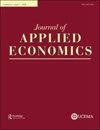The impact of active and passive investment on market efficiency: a simulation study
IF 2
4区 经济学
Q3 ECONOMICS
引用次数: 0
Abstract
ABSTRACT We create a simulated financial market and examine the effect of different levels of active and passive investment on fundamental market efficiency. In our simulated market, active, passive, and random investors interact with each other through issuing orders. Active and passive investors select their portfolio weights by optimizing Markowitz-based utility functions. We find that higher fractions of active investment within a market lead to an increased fundamental market efficiency. The marginal increase in fundamental market efficiency per additional active investor is lower in markets with higher levels of active investment. Furthermore, we find that a large fraction of passive investors within a market may facilitate technical price bubbles, resulting in market failure. By examining the effect of specific parameters on market outcomes, we find that that lower transaction costs, lower individual forecasting errors of active investors, and less restrictive portfolio constraints tend to increase fundamental market efficiency in the market.主动和被动投资对市场效率影响的模拟研究
本文章由计算机程序翻译,如有差异,请以英文原文为准。
求助全文
约1分钟内获得全文
求助全文
来源期刊

Journal of Applied Economics
ECONOMICS-
CiteScore
3.00
自引率
0.00%
发文量
57
审稿时长
40 weeks
期刊介绍:
The Journal of Applied Economics publishes papers which make a significant and original contribution to applied issues in micro and macroeconomics. The primary criteria for selecting papers are quality and importance for the field. Papers based on a meaningful and well-motivated research problem that make a concrete contribution to empirical economics or applied theory, in any of its fields, are especially encouraged. The wide variety of topics that are covered in the Journal of Applied Economics include: -Industrial Organization -International Economics -Labour Economics -Finance -Money and Banking -Growth -Public Finance -Political Economy -Law and Economics -Environmental Economics
 求助内容:
求助内容: 应助结果提醒方式:
应助结果提醒方式:


